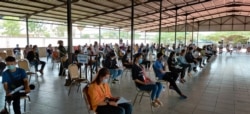Interior Minister Sar Kheng on Wednesday suggested that there were no positive cases of the novel coronavirus among the nearly 86,000 migrant workers who had returned from Thailand in the last month.
In a meeting to discuss measures to help returning migrant workers, Sar Kheng said there are some 86,000 workers who had come back to Cambodia in the last four weeks, all of whom had been placed in quarantine at home and only 600 are yet to complete their isolation period.
He added the workers had displayed no symptoms of COVID-19, despite not having tested many of the workers. The minister admitted that the government was unable to test all workers.
“If they don't have symptoms of the virus, it means they don't have the disease,” he said.
In a press conference on Monday, Ly Sovann, a spokesperson of Health Ministry, said only around 400 of returning migrant workers had been tested and they were negative.
The Cambodian Ministry of Health has reported no new cases of novel coronavirus for the last 10 days, a development the World Health Organization said was “really great news” but still warned that the country was likely in the “early stage” of the pandemic.
As of Thursday morning, there are 122 confirmed cases of COVID-19, with 110 recoveries - representing some 90 percent of the total cases.
Around 150 to 200 workers are coming back from Thailand every day, said Sar Kheng, raising concerns about a potential increase in poverty due to the economic fallout from the pandemic.
In September 2018, UNDP and the Oxford Poverty and Human Development Initiative released the Global Multidimensional Poverty Index, which estimated that more than a third of Cambodians live in poverty.
“They always expect to go back to work and earn income for the family. But in this current situation, we can't allow them back passing the border,” Sar Kheng said.
“If they can't go back, how will they face their living?” he said.
Thailand is home to around 1.2 million Cambodian migrant workers, according to Cambodian government estimates, a significant number of whom are undocumented.
A 2019 International Organization for Migration report showed that a third of migrant workers surveyed were unemployed before leaving Cambodia, nearly half had zero income and around two-thirds moved to Thailand due to a lack of job opportunities in the Kingdom and to earn a better income.
Khun Tharo, a program coordinator at labor rights group Central, said migrant workers have no choice but to stay home since “there are no jobs for them in Thailand.”
“I don’t think there are local jobs for them inside the country,” he said, adding that there was agriculture work but it was unclear if all workers had farmland.
He added that only the government was able to help them by supporting their daily needs. “There is nothing besides government’s support,” he said.
Ann Sreylis, a migrant worker living in Takeo province’s Bati district, said she will have to work as a garment worker because there were no job opportunities. But, even the garment sector is facing hardships as global brands have frozen orders and deliveries.
“There is no work to do here. I want to work temporarily as a garment worker nearby here,” she said. “I am waiting for the border to open.”





